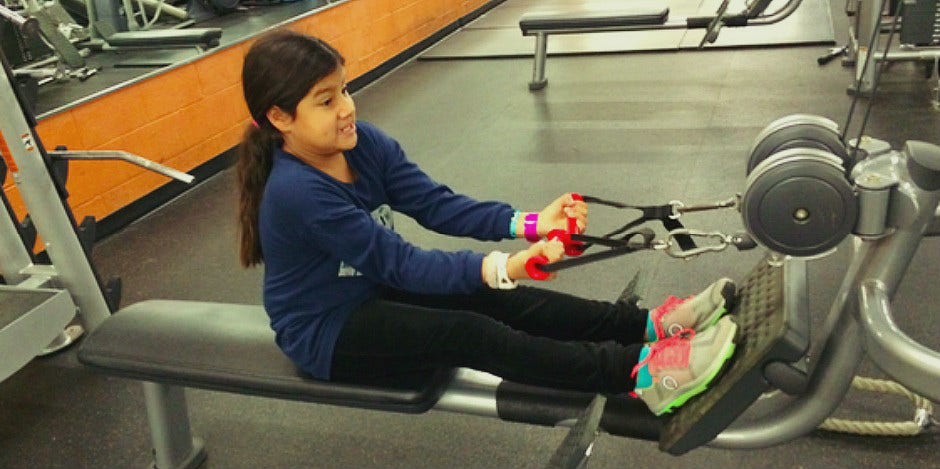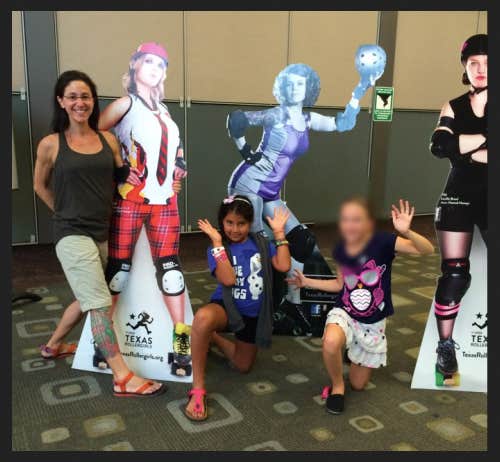Why I Empower My 10-Year-Old To Embrace Her Physical Strength
Guess what, mom? It starts with you.
 Carla Birnberg
Carla Birnberg My daughter has always been proud of her strength.
When she was little, she'd perform tiny pull-ups from inside her pack and play. As a toddler, she'd greet friends new and old by bear-hugging, hoisting them off the ground, and walk-carrying them across the playground. (This definitely made for more than a few awkward moments with said friends' parents/caregivers).
RELATED: 20 Things We're Not Telling Little Girls - But We Should
Strong and nurturing have always been her words. Not so much that we strive to stay healthy together or internal/external strength is valued in our family — she simply knows her power.
She's aware she's capable.
She's aware she's strong.
She's proud of these traits.

Photo: Author
Turning double digits hasn't shaken her confidence in the slightest. Instead of starting to worry or obsess about her transitioning body, she's excited for the changes ahead. And even more thrilling to her is that she's officially allowed to lift weights with the "big people." (Gold's Gym rules. I have my own about body weight versus iron at age 10.)

Photo: Author
The past month or so has been a constant stream of flexing or performing feats of strength with her saying, "Mama I'm so strong!"
The thing is, in addition to my counseling background, I was once a girl. I'm all-too-aware with regards to self-esteem that we're entering a treacherous time: the period where she may lose her voice and no longer value being powerful and taking up space in the world. Where she may, for lack of a better phrase, start to feel stoppable and weak.
RELATED: 10 Ways Moms Can Build Confidence Back After Having A Baby
Right now I cannot even imagine that version of my kid. Right now, I realize, is a crucial time to lay (more) foundation so she remains confident in who she is. Here's how I'm endeavoring to do that:
4 Ways I Empower My 10-Year-Old To Embrace Her Physical Strength
1. I tell her I believe in her.
And I work to show her faith through my actions no matter her goals. No matter whether I may think their aspirations are realistic or lofty, I support, encourage and let her know I believe in her at every opportunity.

2. I love what she loves — even if I hate it.
So far I've been fortunate. She loves skating; I love skating. She loves gymnastics; I used to kick ass at gymnastics. If she fell in love with Minecraft, horror movies, or skiing (none of which I'm drawn to), I'd fall in love with those, too. It's all about creating and maintaining connections. I will do what I have to in order to facilitate that.

3. I love how I look.
Quite frankly, I don't spend much time thinking about my appearance. It's neither good nor bad — it's just who I am. Research indicates, however, that mothers who are vocal about their dislike for their bodies foster those same feelings in daughters.
Even though I don't do that, this all still feels like a crapshoot to me. I wonder about the power of peers and media? I wonder if being adopted will play a role? I'm doing my part and praying. A lot.

Photo: Author
4. I compliment her honestly.
She may be only 10, but she's definitely aware if someone is being authentic. "You're amazing at math!" wouldn't ring true to her because she's not. We all have different strengths and weaknesses. I've watched her become aware of how others compliment her. "That drawing is absolutely fantastic!" when she knows she's not an artist is shrugged off, but "You're a super-fast skater!" is held close and treasured.
RELATED: Why Six Weeks Maternity Leave Is An Absolute Joke

Photo: Author
Adults sometimes forget that kids can see through compliments not anchored in reality, and it also sparks them to mistrust us in other areas. Grit, resilience, and tenacity are the focus of my kind words.
Carla Birnberg is the author of What You Can When You Can and she's on a mission to help you live a healthy life on your own terms.
